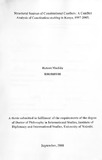Structural Sources of Constitutional Conflicts: A Conflict Analysis of Constitution-making in Kenya, 1997-2005
Abstract
The study investigates the structural sources of constitutional conflicts in Kenyan society
by examining the process and content debates in the constitutional review process that
took place between 1997 and 2005. The study is based on the premise that a country's
constitution is a fundamental pillar on which the society is structured. The study applies
the structural violence theoretical framework to provide a deeper insight into Kenya's
constitutional debates. It develops the hypothesis that an anomalous constitution
engenders structural violence in society. Both primary and secondary sources of data
were used to carry out the study. Non-probability stratified sampling is used in the study.
This study argues that the existing Kenya constitution is a fundamental source of
structural violence in Kenya. Constitutional conflicts arise because the constitution does
not address many of the concerns of its citizens such as equitable distribution of resources
and the protection of individual and minority rights. The study also contends that the
process of constitution-making and the content of the constitution are inextricably linked.
A defective process leads to an anomalous constitution. The study also finds that attempts
to address constitutional conflicts in Kenya have often been settlement rather than
resolution-oriented thereby rendering them less effective. Constitution-making is
eminently a political process and both the Kenyan political landscape and the broader
political context of African states need to be considered to adequately appreciate Kenya's
constitutional conflicts.
Citation
Doctor of Philosophy in International Studies, University of Nairobi (2008)Sponsorhip
University of NairobiPublisher
Institute of Diplomacy and International Studies

